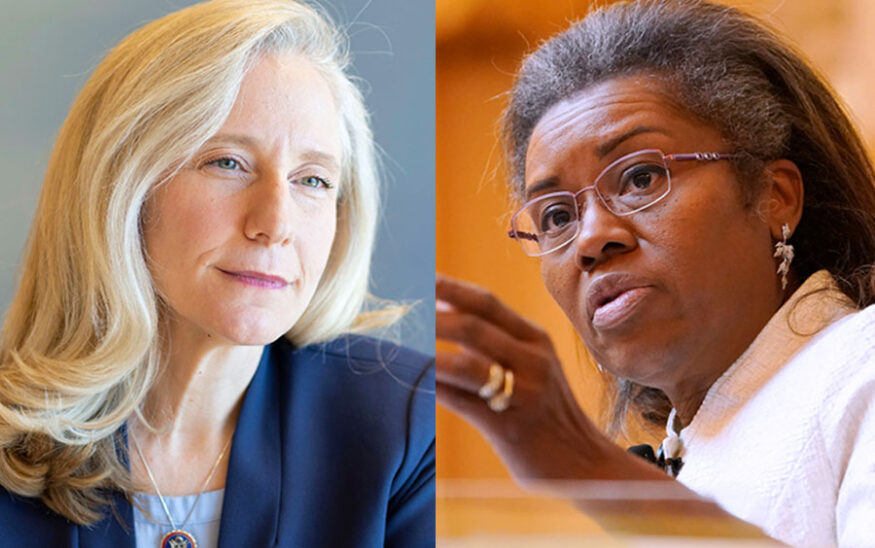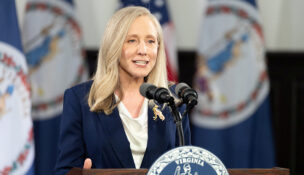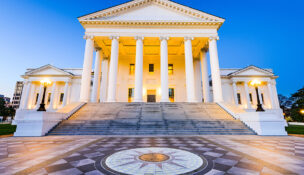Election 2025: Earle-Sears vs Spanberger race guarantees history
Kate Andrews //September 29, 2025//


Election 2025: Earle-Sears vs Spanberger race guarantees history
Kate Andrews //September 29, 2025//
Summary
- Virginia will elect its first female governor in 2025
- Democrat Abigail Spanberger leads polls, outraises GOP rival
- Republican Winsome Earle-Sears stresses tax cuts, parental rights
In January, Virginia will inaugurate its first female governor — but that’s about the only thing Virginians can count on. Who will win this fall’s election and what her legislature will look like are still up in the air.
In the Democrats’ corner is former U.S. Rep. Abigail Spanberger, a three-term congressional representative and former CIA officer who grew up in Henrico County. Lauded by some and chided by others for her moderate record, Spanberger has focused her gubernatorial campaign on producing jobs with business-friendly policies, as well as lowering energy, housing and health care costs.
Her Republican opponent is Lt. Gov. Winsome Earle-Sears, elected in 2021 as the state’s first female lieutenant governor, as well as the first Black woman and female military veteran to hold statewide office in Virginia.
A native of Jamaica who immigrated to New York as a child, Earle-Sears is a Marine Corps veteran who represented parts of Norfolk and Virginia Beach as a Republican state delegate in the early 2000s before she unsuccessfully challenged U.S. Rep. Bobby Scott, D-Newport News, for his seat in 2004. A small business owner, she has focused on lowering costs for Virginians, but with an emphasis on tax cuts and ridding the state of wasteful spending.
Statewide polls have consistently placed Spanberger leading the race beyond the margin of error, although an August Roanoke College poll indicated that Earle-Sears has gained ground as Election Day nears.
As of June 30, Spanberger had also considerably outpaced Earle-Sears in campaign fundraising, bringing in $27 million to Earle-Sears’ $11.5 million.
In addition to the gubernatorial candidates, Virginians will choose the state’s next attorney general and lieutenant governor this fall. Also, all 100 seats in the Virginia House of Delegates are up for grabs, determining which party will control the legislative body.
Virginia Business requested interviews with both gubernatorial candidates to discuss their business-focused policies and other major priorities. Spanberger answered questions via email in early September, but Earle-Sears’ campaign did not respond to multiple requests, following an initial contact.

Trump 2.0 impact
While the candidates aim to keep the focus on Virginia issues, President Donald Trump is undoubtedly the elephant in the room, especially with the impact on Virginia from his administration’s cuts to the federal workforce and contracts held by Virginia government contractors.
This has been to Spanberger’s benefit during the campaign, as she has been able to connect rising unemployment and job losses directly to the Republican White House — and score points on her opponent’s reluctance to discuss its toll on the state’s federal workforce, which is the second largest in the nation.
In a CNN interview in July, Earle-Sears declined to answer questions about Trump’s federal job cuts, saying, “I want to talk about real issues,” a line that Spanberger’s campaign promptly used in an ad criticizing Earle-Sears’ support for Trump.
The lieutenant governor, after changing campaign management, has spoken more about her military and business-owner background, as well as focusing on parental rights and anti-transgender rhetoric familiar to national political watchers.
In September, an Earle-Sears ad said Spanberger is for “they/them, not us,” referring to Spanberger’s congressional votes supporting transgender people’s access to public bathrooms and school sports.
Even without Trump’s policies disproportionately impacting Virginians, Earle-Sears would be at a disadvantage running for governor with a Republican in the White House, says Stephen Farnsworth, director of the University of Mary Washington’s Center for Leadership and Media Studies. Four years ago, some observers chalked up Democratic former Gov. Terry McAuliffe’s 2021 loss to Republican Glenn Youngkin in part due to Democratic President Joe Biden’s unpopularity.
“Virginians tend to show anger against whoever is in the White House,” Farnsworth says. “The key challenge with the Earle-Sears campaign is dealing with the headwinds from the Trump administration.”

Meanwhile, the lieutenant governor, who wrote in her 2020 memoir that Trump shouldn’t run in 2024, still had not received the president’s official endorsement as of mid-September, although Trump said in August he “would” endorse her.
So far, Earle-Sears appears to be hewing closely to the term-limited Youngkin’s agenda, note both Farnsworth and Virginia Commonwealth University political science associate professor Amanda Wintersieck.
“There is not a lot of daylight between [Earle-Sears] and Youngkin,” Wintersieck says, comparing the two to former Vice President Kamala Harris and Biden. “As a successor, you don’t want to criticize your boss.”
However, personality-wise, politicos say, Spanberger and Earle-Sears are both different from Youngkin, a former co-CEO who has been criticized for his lack of communication and negotiations with the legislature, which has been under at least partial Democratic control his entire term.
Youngkin’s biggest casualty was the failed multibillion-dollar Alexandria arena he pitched that would have been home to the Washington Wizards and Capitals teams, a plan blocked by state Senate Democrats who were not consulted before the governor announced it.
Greg Habeeb, a former Republican delegate and now president of lobbying and communications firm Gentry Locke Consulting, says Youngkin’s attitude caused “frustration among Republicans as well as Democrats,” and that Spanberger has a reputation as being “more collaborative” in Congress, even without experience in Richmond.
Earle-Sears, meanwhile, has “had to find ways to work with people across the aisle,” Wintersieck says. “When I talk with people who have worked with her in various capacities, they say she is very pleasant to work with.”
Even if Republicans regain control of the House of Delegates and Earle-Sears were elected governor this fall, she would still need to work with the Democratic majority state Senate, where she occasionally cast tie-breaking votes as lieutenant governor.
However, with wins in statewide and local races this fall, Spanberger and Democrats could run the table.
If Democrats maintain control of the General Assembly, Spanberger will have opportunities to pass legislation with relatively little friction — but political experts say they don’t expect a rerun of 2020-21 under Gov. Ralph Northam, when the state passed some of its most progressive legislation in state history, including legalizing marijuana possession and ending capital punishment.

Former Republican state Del. Chris Saxman, president of nonpartisan organization Virginia FREE, which focuses on state politics‘ impact on business, notes that the legislative “new kids on the block” who arrived with Northam in 2018 had more progressive priorities. Current state House Democrats, especially Speaker Don Scott, are “more pragmatic, more willing to listen to the business community,” Saxman says.
Also, adds Wintersieck, this is a “different political space now compared to 2020-21. I think [Spanberger] will have two solid years to pass her agenda, and a lot of legislation will get through the legislature. Spanberger will bring it back to the economy, cost of living [and] clean energy around data centers,” as well as protecting abortion rights in the state constitution.
Finally, the second half of Northam’s term hit during COVID and the 2020 national racial justice protests, “so he was moving with his time,” Habeeb notes, but Scott and Spanberger would likely not go as far in pursuing progressive legislation “because of backlash. Scott acts as the brakes.”

Competing viewpoints
If elected governor, Spanberger’s major legislative priorities would be to “lower health care, housing and energy costs across the board — including by leveraging all tools available to protect Virginia businesses from tariff uncertainty brought on by the Trump administration,” she wrote in response to Virginia Business’s questions.
“I will work with our General Assembly to build an economy that brings new opportunities to Virginia workers and businesses,” as well as prioritizing the state’s public schools — “not defund them like my opponent would,” Spanberger wrote.
Her agenda also includes “investing in a skilled and prepared workforce, reliable infrastructure, affordable and quality health care, affordable child care and housing for Virginia workers, and strong public schools,” she wrote.
Earle-Sears’ economic platform is focused on reducing the cost of living, including “common-sense tax cuts” such as eliminating the car tax, according to her website. She also is a “staunch supporter of Virginia’s right-to-work policy,” and says that the state’s business- and worker-friendly environment “has contributed to our increased job growth, higher wages and lower unemployment rates.”
Asked about the state’s rising unemployment rate over the past seven months, as well as predictions of more job losses in 2026, Spanberger wrote, “My administration will work aggressively to foster a strong business climate that attracts new economic investment to communities across Virginia and support businesses in Virginia wanting to expand their operations. I will also put the full strength of my administration behind assisting fired federal employees and contractors with finding new jobs that keep these public servants in Virginia.”
In addition to her CNN quote about preferring to focus on “real issues” when asked about federal workforce cuts, Earle-Sears was captured on audio at a March event saying to supporters, “How many here have ever lost a job? Oh, you mean it’s not unusual? It happens to everybody all the time? OK. The media is making it out to be this huge, huge thing, and I don’t understand why.” MeidasTouch, a liberal media outlet, distributed the audio, which Virginia Democrats seized on to criticize Earle-Sears.
In a June interview with The Hill, the lieutenant governor brought up Youngkin’s talking points about federal job cuts, which include that Virginia has 250,000 job openings statewide and more than $1.5 billion in the state unemployment insurance fund.
As for economic development and business attraction, Spanberger pointed to her “Growing Virginia” plan to attract business investments across the commonwealth and potentially restore Virginia to No. 1 on the CNBC Top States for Business rankings, after it fell to No. 4 this year.
“I will work with the General Assembly to make sure we’re setting up businesses and workers for success in our 21st-century economy,” Spanberger wrote, “including by investing in registered apprenticeship programs for the next generation of Virginians.”
In July, Earle-Sears’ press secretary issued a statement regarding Virginia’s decline in CNBC’s Top States for Business rankings as being the fault of “liberal control in the General Assembly. It’ll be hard-working Virginians who pay the price if Abigail Spanberger is governor.”
Earle-Sears, speaking to The Hill in June, accused Spanberger of “saying that she is going to force all of us, … every single employee, to join a union,” although Spanberger said in May that she would not repeal right-to-work laws. The lieutenant governor went on to say that repealing the state’s right-to-work statute would be “a nightmare” that would cause businesses to “up and move.”
As for energy priorities, Spanberger says she is “committed to the long-term goals of the Virginia Clean Economy Act — and right now, I think we need to focus on how to get there. I also understand that Virginia must meet immediate energy needs with affordable, reliable energy — and that natural gas will continue to be an important part of our energy mix in the short- and medium-term.
“Virginia has the potential to be a global leader in advanced energy technologies — and we must be much more aggressive in our pursuit of building new clean energy generation, including small modular nuclear reactors.”
In a Washington Examiner op-ed addressing energy policy, Earle-Sears echoed Youngkin’s “all of the above” energy plan, including “oil, natural gas, small modular nuclear reactors, biomass and renewable energy,” which “all have a place in our dynamic future.” She calls the VCEA a “disastrous” law that produced a “hefty increase in electricity bills.”
Spanberger supports Dominion Energy’s $10.9 billion offshore wind farm in Virginia Beach, which is set to be complete in 2026, but added that the Trump administration has taken a “sledgehammer approach to governing” that is “hurting Virginia,” pointing to the August withdrawal of a $40 million federal grant to an offshore wind facility in Norfolk.
Saxman and other political observers say that Spanberger would need to be careful as governor not to irritate Trump, lest he halt work on the wind farm or engage in some other form of retribution. “I think if you poke that bear across the river, the bear’s going to come out of that cage,” Saxman says. “We’re in a very vulnerable position.”
Earle-Sears, like Youngkin, has been quietly supportive of Dominion’s Coastal Virginia Offshore Wind project, which is about 60% complete. In an interview with Cardinal News, the lieutenant governor said she is “not against solar, not against wind,” a position that puts her at odds with the fossil fuel-friendly Trump administration.
Regarding the increasing energy demand from data centers, Spanberger wrote, “Virginia needs a statewide strategy, not a mandate. … Virginia can benefit from having data centers here — but to reap those benefits, we need to make sure we are accounting and planning for the energy generation, water and other resources needed to support them,” as well as making sure the associated costs don’t drive up household energy rates.
Earle-Sears acknowledged in a July interview with Radio IQ that “data centers aren’t going anywhere,” and in August, she told Cardinal News that she would “bring people to the table and find a compromise” on solving the state’s energy challenges.
Meanwhile, the candidates are also in opposition on the issue of diversity, equity and inclusion programs in the public sector — as well as the Trump administration’s investigations into Virginia universities.
Earle-Sears’ campaign sent out a fundraising email that connected slavery to DEI in May, saying, “Slaves did not die in the fields so that we could call ourselves victims now in 2025.” It went on to call diversity initiatives “DEI nonsense.”
Spanberger, meanwhile, told the Virginia Mercury that she would support universities’ hiring their own counsel to deal with federal investigations and would support making university board appointees’ participation contingent on their confirmation by the state legislature, instead of allowing them to begin sitting on boards immediately after being appointed. A University of Virginia alumna, Spanberger criticized the federal pressure campaign that led to President Jim Ryan’s July resignation.
Addressing another contentious issue between Virginia Democrats and Republicans, Spanberger says she supports creating a legalized retail market for cannabis “that both prioritizes public safety and grows Virginia’s economy,” she wrote. Earle-Sears has not spoken publicly about cannabis retail policy during her gubernatorial campaign but voiced her opposition to recreational marijuana use in 2021.


















